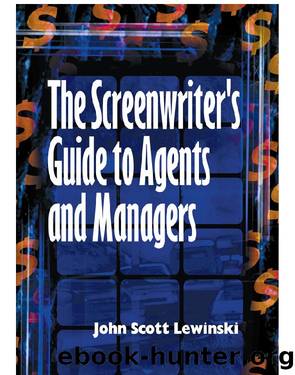The Screenwriter's Guide to Agents and Managers by John Scott Lewinski

Author:John Scott Lewinski
Language: eng
Format: epub
Publisher: Allworth Press
Michele Wallerstein, Wallerstein Management
For insight into the mind of a devoted literary manager, we turn to Michele Wallerstein of Wallerstein Management. Wallerstein represents established, working clients as well as up-and-coming writers. We met her earlier in the introductory section. She formerly managed The Wallerstein Company, a boutique agency handling fewer clients than a Big House like William Morris.
Before opening her own boutique, Wallerstein worked at the Big Houses, representing both film and television writers. She made the switch to managing in 1999 in hopes of offering a smaller pool of writers more personal advice and attention.
I spoke with Wallerstein over breakfast at Hugoâs, a homey little eatery in West Hollywood.
Since Wallerstein started out as an agent and moved to managing later in her career, she has had hundreds of writers approach her for representation over the years. She stressed that one of the main mistakes writers make is sending out their material too soon. If writers canât get access to a producer or a professional writer to critique their material, she suggested going to any one of several professional screenwriting consultants.
âIâm friendly with some of the consultants, even though I was not initially in favor of the entire business. Now I think theyâre a terrific idea.
âThere are so many people who want to be screenwriters. So they write one or two screenplays. They give them to their friends and family in Wisconsin or Ohio and get friendly feedback. Then they send them to an agent. My job is not to read new writersâ material and critique it. My job is to look for talent that I can market, sell, and make into a writing entity in the Hollywood professional community.
âIf someone sends me a new script thatâs never been read by a professional, then either Iâm stuck reading some noviceâs material, or I have to pay someone to read it for me. I should not need to do that. Itâs not my job. âYou should see the number of cover letters that come to me. I kept one for years that began, âI have wrote a screenplay.â I couldnât wait to read that one, right? So I donât want to see a virgin script.â
Wallerstein stressed that if writers spend money and go to a qualified consultant, they will receive protection from an early rejection:
âI know that somebody whoâs been in the industry and knows their job looked at the script. I know that somebody saw talent, a spark, or some level of ability there. That writer has good story sense or good character development ability.â
However, screenwriters should make sure that they find the right person to offer a referral to any agent or manager. Sometimes, if a referral comes from someone with a bad reputation, that can cost a writer dearly.
âI find that there are two kinds of people who read scripts and refer them for the wrong reasons. One kind is an entertainment lawyer. Entertainment lawyers do not know how to read a script. Why would they know how to read a screenplay? Lawyers donât know how stories work.
Download
This site does not store any files on its server. We only index and link to content provided by other sites. Please contact the content providers to delete copyright contents if any and email us, we'll remove relevant links or contents immediately.
The Kite Runner by Khaled Hosseini(5159)
Gerald's Game by Stephen King(4631)
Dialogue by Robert McKee(4385)
The Perils of Being Moderately Famous by Soha Ali Khan(4204)
The 101 Dalmatians by Dodie Smith(3500)
Story: Substance, Structure, Style and the Principles of Screenwriting by Robert McKee(3451)
The Pixar Touch by David A. Price(3426)
Confessions of a Video Vixen by Karrine Steffans(3292)
How Music Works by David Byrne(3252)
Harry Potter 4 - Harry Potter and The Goblet of Fire by J.K.Rowling(3052)
Fantastic Beasts: The Crimes of Grindelwald by J. K. Rowling(3048)
Slugfest by Reed Tucker(2992)
The Mental Game of Writing: How to Overcome Obstacles, Stay Creative and Productive, and Free Your Mind for Success by James Scott Bell(2894)
4 - Harry Potter and the Goblet of Fire by J.K. Rowling(2694)
Screenplay: The Foundations of Screenwriting by Syd Field(2625)
The Complete H. P. Lovecraft Reader by H.P. Lovecraft(2548)
Scandals of Classic Hollywood: Sex, Deviance, and Drama from the Golden Age of American Cinema by Anne Helen Petersen(2508)
Wildflower by Drew Barrymore(2483)
Robin by Dave Itzkoff(2431)
